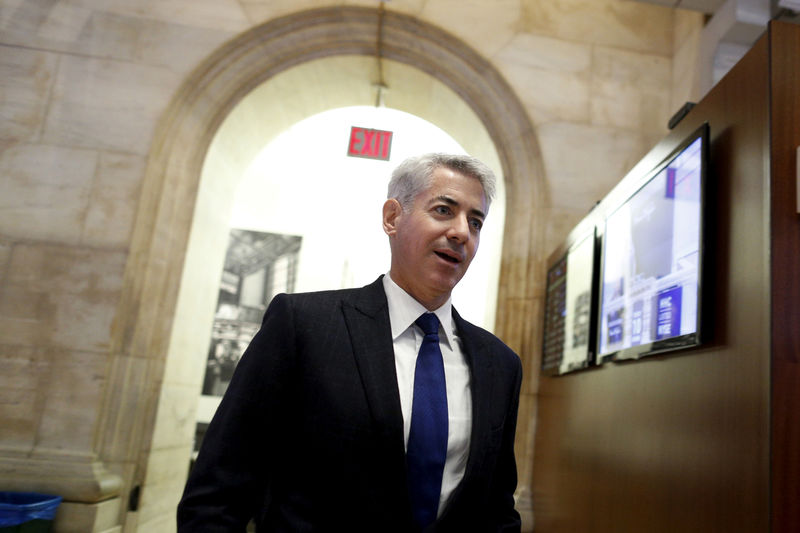By Svea Herbst-Bayliss and Michael Flaherty
BOSTON (Reuters) - Valeant Pharmaceuticals Inc's (TO:VRX) stock price fell to its lowest level in eight years on Tuesday after the abrupt exit of its biggest supporter put renewed focus on the Canadian company's most pressing problem: raising capital to cut its roughly $30 billion debt pile.
Billionaire investor William Ackman spent more than a year trying to revive Valeant's stock price by helping to overhaul management, refresh the company's board, and push for asset sales. But in a surprise move announced on Monday he said he had sold his entire stake, some 27 million shares, and would be leaving the company's board.
He explained the investment was requiring a "disproportionately" large amount of time and resources.
This has been his biggest loser since launching his fund in 2004.
On Tuesday, the Canadian company's U.S. listed shares dropped 10 percent to $10.50, their lowest since May 2009, and a fraction of the near $190 a share Ackman's Pershing Square (NYSE:SQ) Capital Management paid for them in early 2015. He announced his stake in March 2015 and shares surged to $260 a share a few months later.
Probes into its business practices, accounting and drug pricing caused a collapse in Valeant's shares and the company is now offloading assets to try and pay down debt, amassed during a years-long acquisition spree.
Its new management team refinanced the company’s debt burden last week, giving it more breathing room to repay creditors. Its newly issued notes traded down about 0.8 percentage points on Tuesday.
Last week, Valeant told investors that revenue could fall as much as 8 percent this year but that it had paid down about $1 billion in debt and would put proceeds from the sale of its Dendreon cancer treatment business and three skincare brands for $2.12 billion, announced earlier, to that purpose.
"At Valeant right now, it is all about divestitures," said Umer Raffat, an analyst at Evercore ISI. The company committed itself to raise some $5 billion in assets from asset sales by the middle of next year.
The company has also mulled selling the surgical tools unit of its Bausch & Lomb eye care division and letting go of some additional dermatology brands plus several international businesses.
Ackman played a critical role in trying to push management to sell assets, according to an analyst and three people familiar with his actions.
However, his biggest goal of selling the company's gastrointestinal unit Salix to Japan's Takeda was not reached after a disagreement over price, one person said on Tuesday.
There were mixed reactions to Ackman's exit.
"With ... one of its most vocal supporters selling its stake near the low for the past 10 years, we see this as a vote of no confidence for the stock and that things are continuing to go from bad to worse for Valeant," said Wells Fargo (NYSE:WFC) analyst David Maris, who rates the stock an underperform.
But one investor in Ackman's fund, Pershing Square Capital Management, said his departure could give management more room to act and eventually pave the way for other investors to step back in.
Ackman's concentrated bets and brash declarations - he once said Valeant would hit $448 a share by 2019 - have made him a polarizing figure on Wall Street with some investors keen to take the opposing view from him.
Hedge funds, which can flip stocks quickly, owned 28 percent of Valeant's shares at the end of last year, according to data from Goldman Sachs (NYSE:GS). Valeant has long been one of the hedge fund industry's favourite bets. But some 9 percent of Valeant's shares were lent out to short sellers betting that the stock would go down, according to the bank.
OTHER ACTIVISTS
Ackman first bought Valeant as a passive investment, saying he was happy with management. He shifted gears a year ago when the company faced several probes.
Ackman secured board seats for himself and a colleague, fired then chief executive Michael Pearson (LON:PSON), and helped persuade Joseph Papa to join Valeant as CEO.
He played a significantly more hands-on role than other investors, including activist fund ValueAct, which had helped build the company by recruiting Pearson to the top job years ago.
John Paulson's Paulson & Co, which tends to keep a low profile and serve on few boards, is now Valeant's biggest investor with ValueAct, which has one board seat, its second largest.
ValueAct did not respond to requests for comment and Paulson could not be reached.

With Ackman and his firm's vice chairman, Steve Fraidin, stepping off the board at the next annual meeting, there is a question of who might take their seats. It is unclear whether Paulson might put forth a representative or ValueAct, which once had two seats but has been trimming its exposure, might add another person.